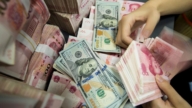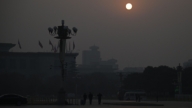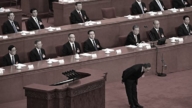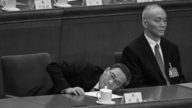【新唐人2013年11月11日訊】中共三中全會正在閉門召開,此前放出的土地改革,給外界一種中共「要變了」的錯覺,不過,從內部人士透露出的消息則發現,新土改沒有多少新意。有評論認為,中共新政意慾改革,但拚命保黨的底線,使得他們在中共上下內鬥中,束縛手腳,以致事與願違。
據《中國經營報》轉述國土資源部人士的消息說,土地改革已經定調,「城建開發用地」可能列入公益用地範疇。這代表城市周邊未來將變成城市區域內的農村集體土地,仍將由政府實施徵收,才能進入建設用地市場進行交易。目前已經列入「列舉」徵地範圍的土地包括:教育、能源、基礎設施、國防設施、政府用地等。
大陸金融分析師任中道:「作為土地改革來說,如果徵地制度不改變的話,一切都沒有甚麼變化,雖然他用教育用地,公益用地去徵地,但實質上,中共隨時都可以更改,徵下來之後,放一段時間去做房地產都可以的,因為本身制度是他自己定的。」
消息還說,「土改」包括﹕土地「招拍掛」出讓制度、和農村集體土地流轉試點、以及宅基地流轉試點等改革。
時政評論員林子旭:「中共在三中全會以後或許有可能去搞一些試點,讓老百姓對中共又產生一些幻想,這樣中共又能找到一些喘息的空間,但是本質上想要把地方政府獲利最大的土地出讓權交出來,根本不可能。」
大陸金融分析師任中道指出,面對內外交困的政治經濟形勢,中共新政企圖推行一些經濟改革,但是中共高層各派利益集團的紛爭,盤根錯節的紮根在各地方政府之間,各路諸侯各自為政,遇到的阻力特別大。中共高層居於恐懼中共崩潰,會更加集權。
11月8號,國務院總理李克強通過中共黨媒放狠話,他說,地方政府改革是一場自我革命,要義無反顧,並說,地方政府原則上不再直接投資辦企業。
分析人士表示,至此,中央基本將地方政府資金來源堵死,例如,地方政府不能直接發債券,只能由中共財政部代發﹔另外,啟動營業稅改增值稅,將地方政府第一大稅種上收到中央﹔地方政府融資平臺的城投公司,不可以再融資及發城投債。
不過多數專家認為,地方政府會為自我利益處處抗衡中央,消極抵制中央的指令。
林子旭:「習、李的現狀非常清晰,一,他們不敢動中共這個體制,二,他們有來自江派激烈的權鬥壓力,真的要動地方土地這塊奶酪,江派就很有可能藉助地方勢力的不滿把習、李搞掉,這種利益再分配帶來的衝擊都很有可能讓整個中共垮臺。」
中共地方政府以低廉的價格甚至無償從農民處徵收土地,而後翻倍加價作為建設用地對外出售。經濟學家吳敬璉估算,土地價差保守估計為地方政府,大賺了30萬億元左右。
另一方面,到今年(2013年)底,總計有53%的地方債務到期需要償還。地方政府為避免因高起的債務而崩潰,勢必拚命保住能隨時變現的土地。
不過大陸房地產業內指出,不斷升高的土地價格,只能導致一贏雙損的結局,地方政府拿到了高溢價的土地收益,開發商卻因為政府限價而利潤變薄,購房者則要直接面對房價不斷上漲。
不斷提高的土地出讓價格,也導致大陸「地王」頻現,今年9月,北京朝陽農展館附近地塊,折合樓面價格超過每平方米7.3萬元,成為北京市場名符其實的單價新地王。
中國經濟體制改革研究會特聘研究員毛壽龍向《新唐人》透露,土地改革將通過建立「城鄉統一的建設用地市場」,其中最大阻力是傳統的法律和政策。另外,反對方還提出很多顧慮,比如建設用地進入農村以後,會不會導致環境污染﹖或者,失地農民變成流民以後會不會成為國家的負擔﹖而城裡人在農村買了地不開發,或掌握了很多土地,會不會形成新的地主﹖等等。
採訪編輯/劉惠 後製/蕭宇
Third Plenary Session Sets Tone for ‘Land Reforms’
The Chinese Communist Party (CCP) is conducting
the Third Plenary Session behind closed doors.
It is trying to create the illusion that the Party is changing,
but inside sources suggest land reforms remain unchanged.
Our experts believe the new leadership
is insistent on trying to save the CCP.
It is complicated with internal fighting,
and has made reforms impossible.
China Business Journal quoted a source
from the Ministry of Land and Resources.
A final tone for land reforms has been set.
“Urban development land” will include
development of public construction.
This means that the government will continue
land requisitions for market usage of rural land.
Constructions listed in development are education, energy,
infrastructure, defense installations, and government sites.
Ren Zhongdao, financial analyst: “Speaking
of land reform, if the land requisition system
does not change, then nothing will change.
In the name of education, or public construction, land can
be used for any project as long as the land is acquired.
It can be used for real estate
later, because they set this rule.”
The source said that land reforms also introduce
a land transfer auction system, land transfer pilot
station, and residential land transfer pilot station.
Lin Zixu, commentator: “After the third plenary,
the CCP might engage in some pilot activities.
This is to create a false image, so
that the CCP will get some relief.
Land rights have allowed local governments to
collect great wealth, so is unlikely to be changed.”
Financial analyst Ren Zhongdao analyses that the
CCP is politically and economically beleaguered.
The new leadership are meeting major resistance
from high-level vested interest groups,
which are rooted among local governments.
The CCP’s fear of the collapse will
only strengthen its authoritarian stance.
On November 8, the CCP media
publicized Premier Li Keqiang’s demands.
He said local government reform is a
self-revolution that can not be hesitated.
He also indicated that, in principle, local
governments will no longer invest in businesses.
Analysts indicate that the central regime has
blocked funding sources to local governments.
For instance, local governments cannot directly issue
bonds, which will be replaced by the Ministry of Finance.
A business tax reform will transfer the first major
local government takes to the central leadership.
City investment company, which often serves
as a local government financial platform will
no longer conduct financing or issuing bonds.
Most experts believe local governments will contend for
self-interest, and react passively to this central command.
Lin Zixu: “Xi and Li’s current status is very clear.
They would not dare to touch the CCP system.
They are also pressured by the fierce
power struggle from Jiang Zemins faction.
If they try to touch the local governments, Jiang’s
faction will get rid of Xi and Li with their local forces.
The CCP is likely to collapse from the
shock waves from redistribution of interests.”
The CCP local governments have been selling land for
construction at double the value of what it pays to the
farmers, who receive a very low price or even none.
Economist Wu Jinglian gives a conservative estimate
of 30 trillion yuan net earning for local governments.
This was earned through land requisition and selling.
On the other hand, by end of 2013, a
total of 53% of the local debts unpaid.
To avoid bankruptcy due to high debts, the local
government is bound to fight to keep land rights.
The Chinese real estate industry indicates that rising
land prices will only lead to one win and two lose.
The winner is the local government, which
gets a high premium on land revenues.
Both developers and home buyers are the losers
for thinning profit margins and rising real estate.
Expensive land appears because
of the increasing land prices.
In September this year, areas near Chaoyang
Agricultural Exhibition Hall in Beijing, were
valued at 73,000 yuan per square meter.
This has become the new expensive land in Beijing.
Mao Shoulong is a researcher for
China Society of Economic Reform.
Mao told NTD that land reform includes a ‘unified land
market for construction between urban and rural areas’.
However, outdated laws and policies
have become the biggest obstacles.
The opposition parties have also raised a lot of concerns.
For instance, will construction create
environmental pollution on rural land?
Will landless peasants become the country’s burden?
What if the city buyers control lots of
land but are not developing the land?
Will it simply create new land owners?
Interview & Edit / Liu Hui Post-production

























